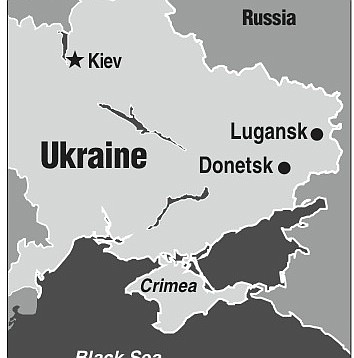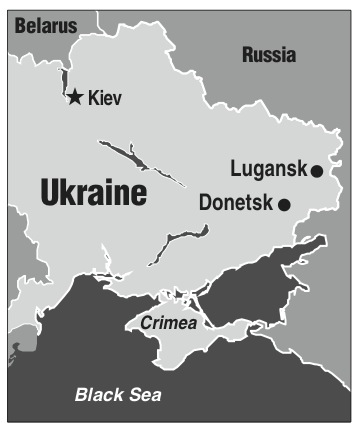If President Barack Obama had given Ukraine some of the firepower it needed to push away the pro-Russian separatists currently ensconced in the eastern sector of the country earlier this year, a Chattanooga missionary to the Eastern European country and his family might be closer to returning to their home there.
Instead, Obama dithered, choosing not to place hurtful sanctions on Russia or give Ukraine weapons or do something with even more oomph like reinstating a Central European missile-defense system, and offered only passive words about Russia being on the wrong side of history.
Meanwhile, Bruce McDonald, wife, Pia, and 12 children (four of whom are still at home), who were sent to the country by Brainerd Baptist Church, are recommitting their ministry in an attempt to alleviate the humanitarian suffering there.
A 30-year Army veteran who retired in 2005 and immediately went into the mission field, he remains in touch with people living in and around their home in Lutugino, a town about 10 miles from the provincial capital of Lugansk and only 30 miles from the Russian border.
The provinces of Lugansk and Donetsk Oblast in the far eastern section of the country have been the scenes of battles between pro-Russian separatists and the Ukrainian army.
Those areas, where McDonald said conditions were "an absolute disaster," stand in contrast to the rest of the country, which he said has good stability and where "life in general is pretty normal."
However, he said the mood in the country had, at best, "shifted strongly pro-Ukraine." At worst, Russia has lost its luster in the eastern provinces because of the "aggressive, separatist terrorists who have invaded."
McDonald said pro-Russian residents thought the invaders would be humanitarian helpers but realize now they're interested only in killing, destroying and looting.
"They're more like a criminal gang than an army trying to liberate," he said, noting that many of them are paid mercenaries from various countries. Others are Russian special operations personnel. "There's a lot of suffering going on."
The McDonalds, who were very involved with charity work in their town and the eastern provinces, "didn't feel any particular threats" until the separatists began ginning up the violence. Eventually, with only one ground route open to them and a general threat to Americans of being kidnapped, they fled on April 28.
Whether they eventually return, he said, has to do with the war. "The conflict," he said, "would have to subside. [Their town] would have to remain Ukrainian territory."
As to what will happen, McDonald says all Ukrainians just want peace. Ukrainians who have been liberated from separatist-held areas want to remain in a united country. Citizens still under siege don't care under whose rule they live as long as there is peace.
"My sense is [the provinces] will stay in Ukraine," he said. "The conditions are hard to call, though. But there are a huge number of troops on the border, and many believe Russia will invade under the flag of being peacekeepers. It's hard to know."
In the meantime, McDonald and his family have shifted their efforts stateside to collect money and items that can be used by residents of the ravaged eastern provinces.
Before the war, he said, people in small and medium Ukraine towns did well if they made $150-$200 (American) per month. In cities like Lugansk, $500 a month was "a really good wage." Around one in four families owned an old car, he said, but the cost of food is on par with that in the United States. So "the standard of living is really low, compared to here."
"As war has come," he said, "it's far worse. You can't work in the cities. A majority of the businesses have collapsed. There's no banking structure. There's no water and no food being delivered. It's an absolute disaster."
So, while Obama may, in essence, disassociate himself from the country's problems, Ukrainans can be grateful for people like the McDonalds, who have decided to turn their minus into a plus for their adopted country in a time of crisis.

